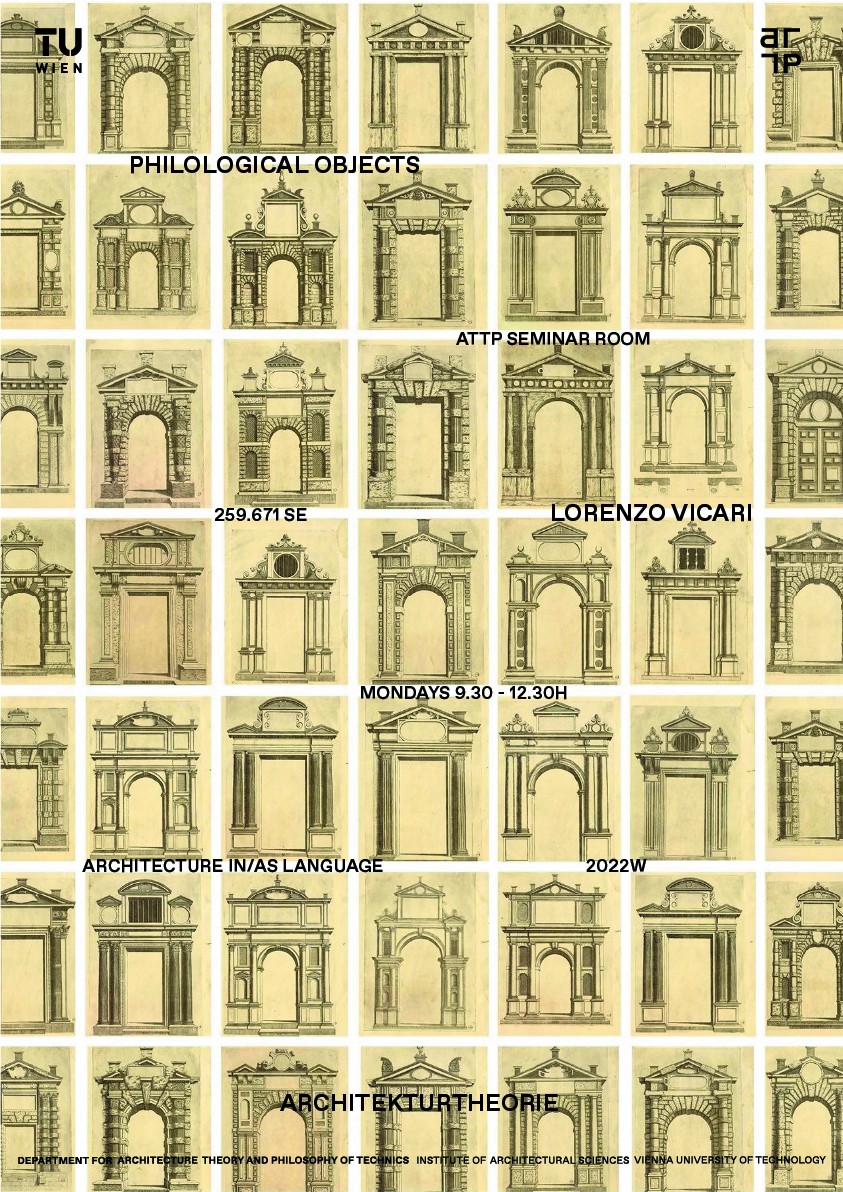Nach positiver Absolvierung der Lehrveranstaltung sind Studierende in der Lage, mit Texten zu arbeiten, eigenständig konzeptionelle Ideen zu entwickeln und zu einem abstrakten Thema in Form von strukturierten Diskussionen und einer selbst verfassten wissenschaftlichen Arbeit Stellung zu beziehen.
Die Studierenden werden mit der Praxis des close reading vertraut gemacht und erlernen den korrekten Umgang mit Zitaten und Bibliographien, die Grundprinzipien der Bibliotheks- und Internetrecherche sowie primäre Argumentationsformen. Die Teilnehmer sind in der Lage, ein Thema so wahrzunehmen, zu strukturieren und zu gliedern, dass es in einer wissenschaftlichen Arbeit diskutiert werden kann, und verschiedene stilistische Formen des anspruchsvollen wissenschaftlichen Schreibens zu schätzen.
Darüber hinaus erlangen die Studierenden ein breiteres Verständnis von Architektur, nicht nur als eine Disziplin, die auf die Realisierung von Gebäuden abzielt, sondern auch als ein Instrument des architektonischen Denkens, das sowohl materielle als auch immaterielle Bereiche der Produktion und Theorie betrifft und verbindet.

Philological Objects: Architecture in/as Language
"The object of philology is—in extension and in intensity (reality), as well as in the intention directed toward it—infinite. It lies, as Plato might say, ‘epékeina tes ousías’. It is therefore not an object of a representation or of a concept, but an idea. (...)The elements of language explicate one another. They speak for that which still remains to be said within that which is said; they speak as philological additions to one another. Language is archiphilology."
Werner Hamacher, Minima Philologica
‘Architecture as Language’ is an ancient metaphor: Doric, Ionic and Corinthian were Greek dialects before Vitruvius turned them to describe forms, proportions and part-to-whole relations of elements in temples; the classical shift between Gothic and Renaissance can be read as an epochal change in vocabulary; Alberti (as well as Palladio, Serlio, Vignola, Scamozzi and other architects from the Renaissance) attempted to write treatises that lay down the rules for ‘proper building’ in the same manner as Pietro Bembo and other humanists wrote the rules for ‘proper writing’; even Le Corbusier’s Vers Une Architecture, Venturi’s Complexity and Contradiction in Architecture and Koolhaas’ Delirious New York may be seen as axial texts for modern and contemporary architecture because of their vocabulary and grammar, because of their “way of speaking”.
For architecture to be an active actor in the public domain -for it to be an exact and civic art- language (that through which communication takes place) is, simply, unavoidable. ‘Architecture as Language’ is an ancient metaphor that is still at stake.
Language is the medium through which everything communicates. Translation is the model through which communication exists. Communication in Architecture is about the translation (a bringing into proportion) of an event: a crystallisation of a unique relation between space, time, mass and light; a relation that engenders what is commonly calledexperience of space. Thus, translation is not an act, but a mode, even a mood. A Stimmung. Nevertheless, what and who communicates within architecture? How? And why? Looking at Philology to think buildings in the light of translation implies that any model of communication in architecture contains -at any scale- its own reflective language, immanent to each sample as well as expressive of the whole: an architectonics of communication that emerges in Philology.
Philology expressively deals with languages through a written or spoken notion of language, while Architecture entails a relation with language through what is commonly called the spatial experience of a building. Why is then a rich approach for us, architects, to look at Philology? Why should we all (re)become philologist? Simply because Philology and Architecture both are concerned with communication and translation. In this sense, we may say that architecture is literally a philological discipline: it has a certain autonomy, it is general, it is affective (it affects our words as well as our words affect it). Moreover, the notion of form, of place, of space as we are used to refer to in architecture are all linked to Language with a double knot: without considering language as their source of significance -without being ourselves archiphilologists- we cannot comprehend their meaning and qualify them in projects.
This seminar will investigate the relation between Philology and Architecture by focusing on architectural projects and by looking at them through the optics of language, communication and translation. On the one hand, we will work through weekly exercises with a design-oriented method that is drenched of a philological attitude and a translational mode: we will understand what means that both architecture and philology are concerned not so much with representation, but rather with ideas and how such an idea can impersonally and objectively lead towards a crystallisation of void (an architectonic experience of space). On the other hand, we will theoretically approach notions as void, place, kinship, likeness, form, copia,... through the work of contemporary architects within which we will learn how to philologically read architectonic projects.